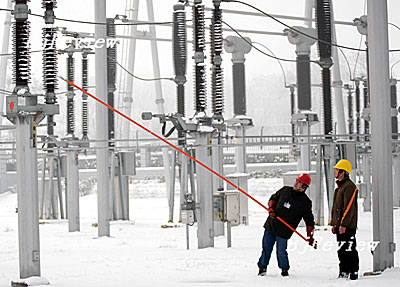|

There's little coal left.
Jiang Zhangshui wears an expression of worry on his face. As president of Zhejiang Tianma Thermal Power Co. Ltd., he's had to keep his eyes on the snow falling in Shaoxing, Zhejiang Province. During a lull in the storm he drives to the airport and flies to Beijing.
Like his counterparts at many other power plants across the country, he has to find coal, so his company can continue to generate electricity and provide hot water and electricity to businesses, schools and hotels in his region.
Since mid-January, when heavy snow hit central, east and south China, supplies of coal and power had been tight. According to the National Development and Reform Commission (NDRC), 17 provinces, autonomous regions and municipalities suffered power shortages and the shortage of electricity nationwide was about 39.9 million kw.
And it's not only power plants that are worried about the coal shortages.
On January 27, the State Council held an emergency teleconference, participated by the NDRC, the Ministry of Railways (MOR), the Ministry of Communications (MOC), the State Electricity Regulatory Commission (SERC) and the State Administration of Work Safety (SAWS), to discuss the severe power disruptions caused by prolonged snow, rain and cold weather.
At a conference held in Beijing on January 28 to relay information on thermal power companies, Jiang and some other entrepreneurs anxiously explained their predicament with the tight coal supply. On the same day, the NDRC also called a meeting to resolve difficulties brought about by the bad weather.
Coal shortages closed more power stations with an aggregate capacity of up to 40.99 million kw, said the SERC. The affected capacity equals up to 40 percent of last year's expansions.
The bad weather affected both supply and demand for coal. Coal transport was hampered by a combination of the bad weather and rising passenger rail traffic as the Spring Festival, the major family reunion occasion in the country, approaches. Simultaneously, cold weather increased coal demand for heating, and heavy rail traffic was also pushing up demand for coal, which helps power the rail system.
Only an average of less than 25 percent of the daily demand for coal shipments by rail had been met, according to the MOR. On January 26, snow and sleet cut off power lines and halted at least 136 trains in central Hunan Province on a major rail artery linking Beijing with Guangzhou, capital of south China's Guangdong Province.
Urgent transport needs
Government departments adopted various measures to transport coal in an attempt to win the battle against heavy snows.
The NDRC started the coordination mechanism for economic operation and established a daily reporting system supplying monitoring information, carrying out real-time monitoring of coal output in major coal production provinces, railway loading, ship loading as well as coal reserves and production in major power plants with staff solving problems in coal and electricity supply around the clock.
Moreover, the NDRC drafted an emergency document on requirements of production and transportation of power-generating coal. Its orders were to ensure the supply to large power plants and suspend coal supply to small enterprises, especially small thermal plants. For example, ports in Qinhuangdao, Hebei Province, were required to ensure coal transportation to large power plants and stop shipping coal to other enterprises. "It's impossible to solve the problem by increasing electricity generated by small thermal power plants," said Zhu Hongren, Deputy Director of the Bureau of Economic Operation of the NDRC.
| 